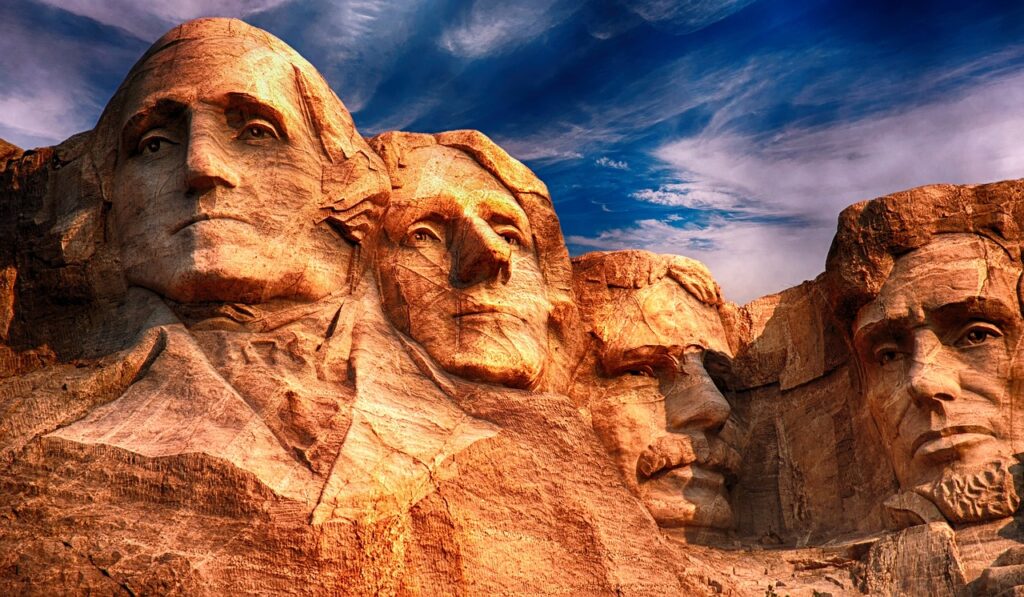
Once a month, a friend and I assemble for a visit. We order a table full of snacks and enjoy catching up. Our conversations tend to meander (in the best possible way) and I especially love (for reasons you can likely figure out) when the topic turns to management. He has been a manager for a while now and seems to enjoy it very much. I always value hearing about his challenges and successes as both Kerri and I are constantly collecting management/leadership anecdotes.
A few months ago, he was explaining an issue with one of his employees. He expressed an interest in handling the situation well (yay!) even if he didn’t “end up on the guy’s Mount Rushmore of managers (MROM).” Now I have been to Mount Rushmore and even taken the behind-the-scenes tour, so this imagery immediately caught my attention.
I asked him who would be on his Mount Rushmore, and he was happy to share, who and why they made the cut.
Since that visit, I have thought about this idea many times and have considered various aspects… things like, what would qualify you for such status and should it even be a goal to be on someone’s MROM?
While I most certainly will continue to think about this, here’s what I have come up with so far…
Gutzon Borglum, the American sculptor responsible for the monument chose two of the four presidents himself. Original plans were only for George Washington and Abraham Lincoln to be featured (www.nps.gov). His desire to include Thomas Jefferson and Theodore Roosevelt was intended to make the project of national interest and capture the first 150 years of our country’s history.
First and foremost, this fact makes me think that each person’s MROM will be highly personal. While it would be ideal if everyone had a wealth of candidates to choose from, the reality is likely to be much smaller.
Next, the criteria for each person’s monument will be different. What makes someone a good manager? Well, like anything else, it’s a mix of science and art. When we talk with managers, there are certain skills we are looking for. Things like… do they conduct one on ones, give timely and specific feedback, continually help develop their employees (and are they doing these things consistently)? Employees can’t always articulate these things, so they are likely to say they “have a good relationship with [their] manager, know what is expected of them, and get chances to grow.” But someone meeting the technical criteria alone isn’t enough to get them on the monument. There are plenty of intangible skills and qualities that employees value and they won’t always be the same for each person.
Which means, you can do everything “right” and still may not be chosen. Again, this is where the intangible stuff will play a big part in their experience. Also, whatever is going on in their personal life is likely to be a factor as well. Sometimes people take a job just to get by or because it fits their current situation, not because they are looking to be inspired to greatness.
Okay, so we can probably all agree that this is extremely unique to each individual you manage, but with that in mind, what can you do to be a manager worthy of consideration?
Start with what would cause you to put someone on your monument. What are the qualities and characteristics that matter to you and how are you doing with exhibiting them? It’s likely that your perspective on this will be a bit skewed, so it might be a good time for some input from others. You can always start with the science of management. Go back to the list of things I shared that Kerri and I would ask about (one on one’s, feedback, development). Then you can move on to the art aka the “heart” of managing. Find out if your employees and colleagues feel supported. Have them share how they think you handle conflict. Check to see if your calendar properly represents your priorities and whether you are giving time to the things that matter most.
If you discover there are some areas that need shoring up, get busy working on them, with a focus on consistency. Mount Rushmore took years to complete (and still requires ongoing maintenance) so remember that being a good manager is a marathon, not a sprint.
So, is it worth pursuing the goal of greatness as a manager? Ultimately, each person will have to decide for themselves, but it’s worth considering the words of the one who headed the team that brought the monument to life, Gutzom Borglum, “Forget about getting a bank balance and don’t be satisfied with things being good enough. Accept only that which is good or the best.”